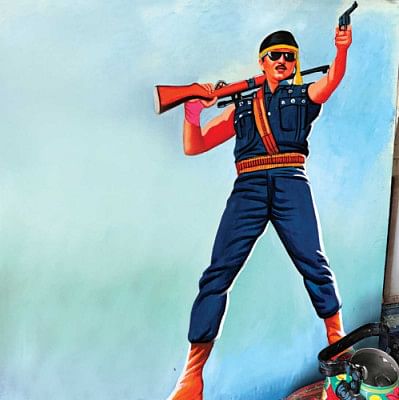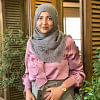Rickshaw painting a dying art form?

Not many things scream quintessentially Bangladeshi as does rickshaw art. Seeing the vibrant colours, picturesque designs, and catchy motifs created by expert hands from afar and in anywhere in the world, one will instantly know it is a representation of Bangladesh. But, is this unique form of art that we proudly call our own on the verge of fading out?
The advent of rickshaw in Dhaka dates back to the colonial period. As a new mode of commute was introduced, it quickly gained popularity, and so did the artform it brought along. Utmost care was taken to decorate a rickshaw with meticulously hand painted murals that took days to complete – a true labour of love.
Within a few years, the city was buzzing with rickshaw painting workshops and the artform was living its glory days. However now, the scene has become dull, as original rickshaw art is rapidly being replaced with digital printing, which is comparatively less time consuming, as well as cheaper.
In fact, there are very few authentic rickshaw artists remaining now, who receive very little opportunity to work and are nearing their retirement. The bigger problem lies in the fact that their following generation is barely carrying on this heritage as a legacy.
In an attempt to continue this art form along with many others via modern means, Dacca, a clothing label, offers contemporary street wear injected with the heritage and tradition of Bangladesh. Founded by three friends in 2019, Dacca is deeply rooted in Bangladeshi culture.
Their design philosophy lies in showcasing artisanal crafts and Bangladeshi art. Traditional forms of crafting fabric such as hand embroidery, handloom, khadi, block print, katan, gamcha, and nakshi kantha are used to create the outfits. One may presume that these artforms only look good on traditional attire, but Dacca is all about modern street wear.
Sweatshirts, t-shirts, baggy pants, kimonos, masks – everything available in Dacca is canvas to some form of traditional art, and authentically so. Their design inspiration is mostly taken from classical paintings, poetry, postal stamps, and rural Bangladesh, which they attain by collaborating with rural artisans.
Dacca is essentially reinterpreting Bengali culture and craftsmanship via street fashion and making a global conversation about the artisanal craft of Bangladesh. Their recent Boishakhi collection features rickshaw art, postal stamps, poetry, rivers and rural Bangladesh.
In the odyssey of rapid urbanization and development, rickshaw art may be a fading craft. But this legacy can be kept alive by turning them into chic attires. While in the past, rickshaw art was a form of self-expression featuring religious and political views, hit movies, and history, in contemporary times, it can otherwise be reinvented to wearable art in order to keep the artform alive.
Keep an eye on Dacca's social media handles for an exclusive documentary on rickshaw artists along with their Boishakhi collection and summer drop, where you can also buy original rickshaw panel art.
Facebook: https://www.facebook.com/fromdacca
Instagram: https://instagram.com/from.dacca?igshid=
YmMyMTA2M2Y= Website: https://fromdacca.com
Photo: Dacca

 For all latest news, follow The Daily Star's Google News channel.
For all latest news, follow The Daily Star's Google News channel. 



Comments